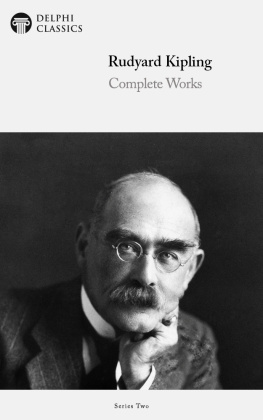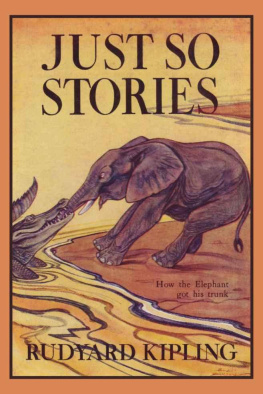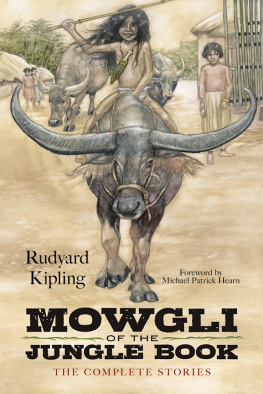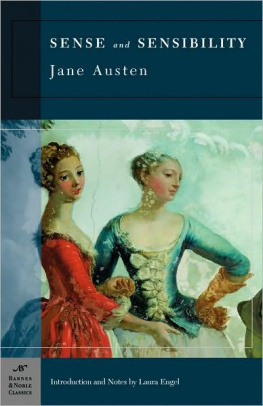Rudyard Kipling
Joseph Rudyard Kipling was born on December 30, 1865, in Bombay, India, to a prominent couple. In 1871 Rudyard and his sister, Alice, were sent to England to live under the foster care of the Holloway family in Southsea. During six years there, the young boy was the subject of frequent physical and emotional abuse, an experience that left him deeply scarred. In 1878, at age twelve, he enrolled at the United Services College in Devon, where he remained for four years. At school he discovered his love of literature and began to write, taking Edgar Allan Poe as his primary model. His first work, Schoolboy Lyrics, was published in 1881.
Kipling returned to India in 1882 and began working at a Lahore newspaper, the Civil and Military Gazette, followed by a three-year stint at another paper, the Pioneer, in Allahabad. At a time when British expansionism was near its zenith, Kipling began writing stories about Western colonization. His volume of poems Departmental Ditties was published in 1886, and in 1888 several collections of Indian stories, including Plain Tales from the Hills and his six-volume Indian Railway Library series, appeared, bringing him immense popularity. Returning to England in 1889 by way of Burma, Malaya, Singapore, Hong Kong, Japan, and America, Kipling attained literary celebrity, though he suffered a nervous breakdown in 1890. After recovering he published a novel, The Light That Failed, and a collection of stories, Lifes Handicap.
In 1892 Kipling married an American, Caroline Balestier, the sister of his friend and agent Wolcott Balestier, with whom he collaborated on a second novel, The Naulahka, published that same year. Barrack-Room Ballads also appeared in 1892. The Kiplings settled in Brattleboro, Vermont, where their daughters, Josephine and Elsie, were born. There Kipling wrote Many Inventions (1893) and the two Jungle Books (1894 and 1895), and began working on Kim. After a violent argument with his brother-in-law, Kipling returned to England in 1896 and settled on the Sussex coast in 1897, the year his son, John, was born and Kiplings novel Captains Courageous was published. Two years later Kipling became seriously ill with pneumonia, and his daughter Josephine died, yet he brought out Stalky & Co. and a travel book, From Sea to Sea.
Kim was published in 1901, and the following year Kipling moved to Burwash, Sussex, where he produced his childrens books Just So Stories (1902) and Puck of Pooks Hill (1906). In 1907 he became the first English writer to be awarded the Nobel Prize for Literature. In 1915 Kiplings son, John, was killed in battle during World War I. Haunted by this event and in declining health, Kipling nonetheless continued to write.
George Orwell described Kipling as the prophet of British Imperialism, and his imperialist sentiments were reflected in such poems as The White Mans Burden (1899). These convictions strengthened as he grew older, putting him at an increasing distance from the political and moral realities of the changing world. Later in life Kipling became highly critical of the Liberal government that won control of the British parliament, finding fault with its pacifist policies during World War I and actively supporting an increase in military spending for national defense. He did not live to see the extinction of his imperialist visions. On January 18, 1936, Rudyard Kipling died, shortly before World War II and the subsequent decline of the British Empire. His autobiography, Something of Myself, was published posthumously.
Inspired by Kim
Rudyard Kiplings masterpiece, Kim, was made into a lavish, MGM-PRODUCED film in 1950. Directed by Victor Saville and starring screen legend Errol Flynn, Kim is an adventure brimming with gorgeous landscapes (much of the film was shot on location in India) and memorable characters who establish themselves quickly. Flynn brings his swashbuckling talents to bear as Kims mentor, Mahbub Ali. Posing as an Afghan horse trader, Flynn cuts the perfect British secret agent, albeit one perhaps past his prime. The eponymous hero is played by a young and wily Dean Stockwell, who portrays the privileged orphan with charm and intelligence, making Kim a convincing candidate for the spy apprenticeship for which he is fated. Roaming the land and disguised as a native Indian, Kim befriends Mahbub Ali and soon finds himself immersed in the clandestine and dangerous world of the Great GameBritish colonial and military espionagein which he must risk his life to gather information about the Russian forces out to conquer India for the czar.
Saville remains largely faithful to Kiplings text, though sometimes at the expense of the rollicking pace expected of adventure dramas, giving ample attention to the character of the aging lama, played by Paul Lukas. Saville conveys the mystique of nineteenth-century India with beautiful costumes and sets, all dressed in sparkling Technicolor. The film features a score by famed composer Andr Previn.
John Howard Daviess adaptation of Kim, which aired on television in 1984, was also shot on location in India. In this version, Kim is a street urchin living hand to mouth in Lahore. Ravi Sheth portrays Kim as streetwise teenager, but one who is ultimately kindhearted. Kim must weigh his two possible futures: one as the disciple of a wizened Buddhist monk, played impeccably by Peter OToole, and the other as a spy among horses, led by Mahbub Ali (Bryan Brown) . The drama ensues as the toughened Ali cannot seem to get along with the lama, who will not be ruffled, while Kim, searching for his true identity, learns that he is the son of a soldier who deserted from the British Maverick Regiment. Daviess Kim, which also features John Rhys-Davies (of The Lord of the Rings trilogy) as Babu and Julian Glover as Colonel Creighton, is a thought-provoking portrait of 1890s India at the height of the British Raj.
Comments & Questions
In this section, we aim to provide the reader with an array of perspectives on the text, as well as questions that challenge those perspectives. The commentary has been culled from sources as diverse as reviews contemporaneous with the work, letters written by the author, literary criticism of later generations, and appreciations written throughout the works history. Following the commentary, a series of questions seeks to filter Rudyard Kiplings Kim through a variety of points of view and bring about a richer understanding of this enduring work.
COMMENTARY
ANDREW LANG
At last there comes an Englishman with eyes, with a pen extraordinarily deft, an observation marvellously rapid and keen; and, by good luck, this Englishman has no official duties: he is neither a soldier, nor a judge; he is merely a man of letters. He has leisure to look around him, he has the power of making us see what he sees; and, when we have lost India, when some new power is ruling where we ruled, when our empire has followed that of the Moguls, future generations will learn from Mr. Kiplings works what India was under English sway.
from Essays in Little (1891)
HENRY JAMES
I cannot overlook the general, the importunate fact that, confidently as [Kipling] has caught the trick and habit of this sophisticated world, he has not been long of it. His extreme youth is indeed what I may call his window-bar-the support on which he somewhat rowdily leans while he looks down at the human scene with his pipe in his teeth; just as his other conditions (to mention only some of them), are his prodigious facility, which is only less remarkable than his stiff selection; his unabashed temperament, his flexible talent, his smoking-room manner, his familiar friendship with Indiaestablished so rapidly, and so completely under his control; his delight in battle, his cheek about womenand indeed about men and about everything; his determination not to be duped, his imperial fibre, his love of the inside view, the private soldier and the primitive man.










